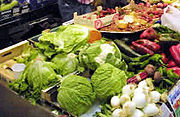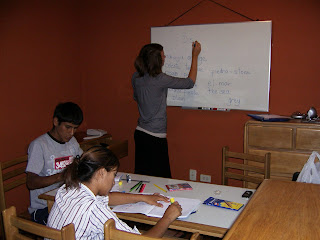 Peru's consumer prices climbed the most in four years last month, and more than economists estimated, led by higher costs for fruits, vegetables and fish.
Peru's consumer prices climbed the most in four years last month, and more than economists estimated, led by higher costs for fruits, vegetables and fish.
The monthly inflation rate accelerated to 1.04 percent in March from 0.91 percent in February, the national statistics agency said today. Annual inflation quickened to 5.55 percent from 4.82 percent in February, the agency said.
Economists had estimated monthly inflation of 0.5 percent and annual inflation of 4.99 percent last month, according to the median estimates compiled by Bloomberg. The central bank may force banks to keep higher levels of reserves on deposits, thereby decreasing liquidity, said Jorge Sanchez, an analyst at Lima-based consulting firm Maximixe Consult SA.
"Inflation was higher than expected,'' Sanchez said in a telephone interview. "It's partly due to food wholesaler speculation and rising prices of imports, which is beyond the bank's control.''
Fish prices rose 7.4 percent last month as demand increased during Holy Week, when many practicing Catholics remove meat from their diets and eat more seafood. Fruit and vegetable prices jumped 9.5 percent as flooding and landslides during the rainy season limited food supplies.
Prices will drop by May as an economic slump in the U.S. blunts demand for commodities, central bank President Julio Velarde said March 27. The bank targets annual inflation of no more than 3 percent.
"Recent cuts in tariffs to food imports and excise taxes to fuels are likely to be helpful, but not in the very short term,'' Boris Segura, an economist at Morgan Stanley in New York, wrote in a March 30 report. "Food inflation is likely to keep exerting pressure.''
Peru's currency, the sol, strengthened 0.7 percent to 2.731 per dollar at 1:25 p.m. New York time.
March's monthly inflation rate was the highest since February 2004.
Alex Emery, Bloomberg.com
Rising prices, accelerating inflation and falling exchange rates are all affecting The Colour of Hope and our work. Funds go considerably less far now than they did a few months ago. We're hoping that the situation evens out by May, as predicted.
 Chronic malnutrition affects one in three Peruvian children under five, with much higher rates in rural areas. Over time, malnutrition can lead to stunted growth and diminished intellectual capacity.
Chronic malnutrition affects one in three Peruvian children under five, with much higher rates in rural areas. Over time, malnutrition can lead to stunted growth and diminished intellectual capacity.  Topics include eating a balanced diet, water safety and hygienic food preparation and storage. The course will not only help the young people take care of their own health, but also that of their children - three of the group already have babies and toddlers to bring up.
Topics include eating a balanced diet, water safety and hygienic food preparation and storage. The course will not only help the young people take care of their own health, but also that of their children - three of the group already have babies and toddlers to bring up. 





















